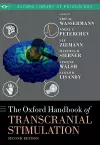
The Oxford Handbook of Transcranial Stimulation
6 contributors - Hardback
£173.00
Dr. Eric Wassermann received his B.A. from Swarthmore College, his M.A. from the University of Pennsylvania, and his M.D. from New York Medical College. After a residency in neurology at the Boston City Hospital, he completed a fellowship in the Human Motor Control Section at the National Institute of Neurological Disorders and Stroke, where he stayed on as a Staff Clinician and independent investigator. His research focuses on revealing the mechanisms of behavioral adaptation and learning in humans, and using noninvasive brain stimulation and other methods to enhance those processes. Dr. Angel V. Peterchev received his A.B. degree in Physics & Engineering Sciences from Harvard University and his M.S. and Ph.D. degrees in Electrical Engineering & Computer Science from the University of California, Berkeley. He completed post-doctoral training in Brain Stimulation at Columbia University. Dr. Peterchev is presently Associate Professor at Duke University in the Department of Psychiatry & Behavioral Sciences, with secondary appointments in Electrical & Computer Engineering, Biomedical Engineering, and Neurosurgery. He directs the Brain Stimulation Engineering Lab which aims to improve noninvasive brain stimulation through the development of devices, computational models, and application paradigms. Dr. Sarah Hollingsworth Lisanby completed her BS, MD, and psychiatry residency at Duke University, and a geriatric psychiatry fellowship at Columbia University. She went on to become JP Gibbons Endowed Professor and Chair of the Duke Psychiatry Department. Her research focuses on innovations in brain stimulation in psychiatry. She conducted the first-in-animal, first-in-human, and first randomized controlled trials with Magnetic Seizure Therapy (MST) to treat severe depression. She leads large scale funding initiatives in 'The Brain Research Through Advancing Innovative Neurotechnologies' (BRAIN) initiative, and directs the Division of Translational Research and the Noninvasive Neuromodulation Unit at the National Institute of Mental Health. Prof. Ulf Ziemann received his MD from the University of Göttingen, Germany. He is currently the Director of the Department Neurology & Stroke, and Co-Director of Hertie-Institute for Clinical Brain Research, University of Tübingen, Germany. He has been Editor-in-Chief of Clinical Neurophysiology since 2016 and Deputy Editor of Brain Stimulation since 2007. His research focuses on motor cortex physiology, plasticity, brain-state-dependent stimulation, transcranial magnetic stimulation, TMS-EEG, and neuropharmacology. His clinical expertise is on stroke, neuroimmunology, and clinical neurophysiology. Prof. Vincent Walsh received his B.A. from the University of Sheffield and his PhD from the University of Manchester (UMIST). Following 10 years of post-doctoral research with Alan Cowey at the Dept of Experimental Psychology, Oxford, he moved to the Institute of Cognitive Neuroscience in 2002. His research now focuses on sleep, learning, and social group dynamics. Prof. Hartwig Roman Siebner is a board-certified neurologist who started his academic career at the Department of Neurology, Munich University of Technology. In 2000, he moved to the Institute of Neurology in London, where he had the privilege to work as research fellow with Prof. John Rothwell. In 2022, he was appointed by the Christian-Albrecht-University Kiel as principal investigator in the collaborative brain imaging initiative 'Neuroimage-Nord'. In 2008, he joined the Danish Research Centre for Magnetic Resonance (DRCMR) at Copenhagen University Hospital Hvidovre and has been leading the research centre as scientific director since 2010.